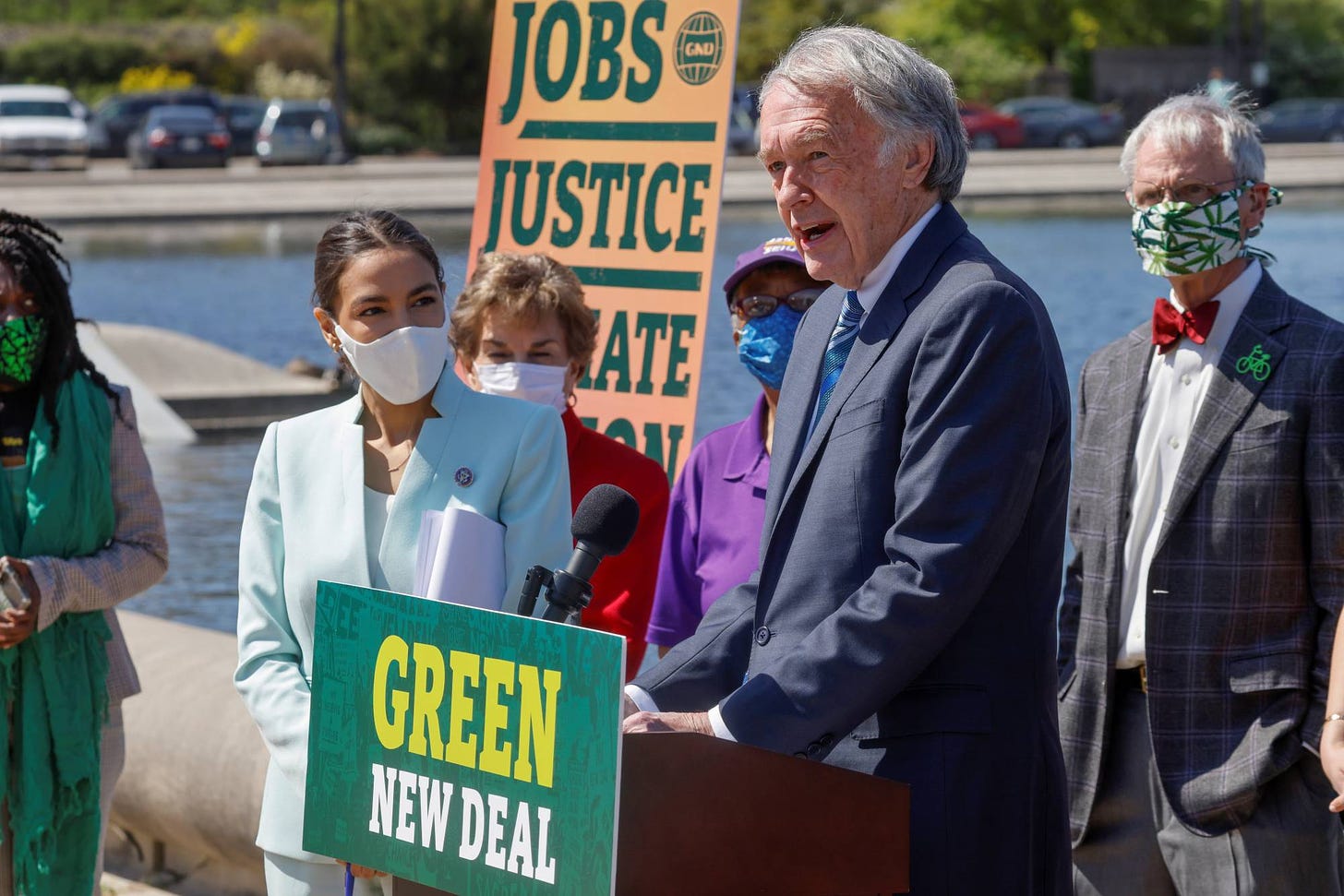The Week in Climate Hearings: Pipelines, Plastics, and Prairie Chickens
Plus: A Green New Deal happy hour with Sen. Ed Markey
The nation’s capital is pleasantly summery today, but will be brutally hot by the end of the week, thanks to the unprecedented, fossil-fueled heating of the entire planet. Before we review Congressional hearings and floor action, there are several activist events this week worth noting—and joining if you can.

On Tuesday evening, the Green New Deal Network is holding its monthly happy hour. While it’s always a great event, this is a special one, as one of the special guest is Sen. Ed Markey (D-Mass.), the co-sponsor of the original Green New Deal resolution. Participants will discuss the “importance of union, environmental, and racial justice organizers uniting to overpower corporate greed.” The happy hour and rally will start at 6 pm at Metrobar in Northeast DC.
At 8 pm on Tuesday, Greenpeace is holding a critically important virtual town hall on protecting activists from abusive lawsuits. Energy Transfer, the company behind the Dakota Access pipeline, is suing Greenpeace as the supposed orchestrator of the Standing Rock protests. SLAPP suits like this are a global threat to public protest, and a favorite tactic of corporate polluters to suppress climate activism.
On a sweltering Thursday morning at 11:30 am, a coalition led by Beyond Plastics is delivering a petition to Environmental Protection Agency Assistant Administrator Michal Freedhoff calling for a ban on vinyl chloride, the toxic chemical involved in the East Palestine train disaster. Before the petition delivery, Beyond Petrochemicals executive director Heather McTeer Toney will moderate a news conference in front of EPA headquarters with Beyond Plastics’ Judith Enck, local activists from East Palestine, and other environmental leaders.
And now, Congress, who will work through the heat wave in air-conditioned offices, unlike the migrants at the Arizona border caged outside in 114° heat. And then Congress takes the whole month of August off, which is nice for them.

Tuesday, July 25
House Republicans are planning to bring to the floor resolutions to disapprove of the Biden administration’s listing of the Lesser Prairie-Chicken and the Northern Long-Eared Bat as endangered species; the Rules Committee hearing setting up the votes on S.J. Resolutions 9 (chicken) and 24 (bat) is at 3 pm. The other main House floor business this week will be the $317 billion military construction and veterans affairs appropriations bill (H.R. 4366).
The Senate is considering the $876.8 billion National Defense Authorization Act for Fiscal Year 2024 (S.2226) on the floor this week.
Wednesday, July 26
The Senate Democratic caucus displays its full diversity1 on climate and the environment on Wednesday.
At 9:30 am, Senate Energy chair Joe Manchin (D-W. Va.) chairs yet another anti-environmental hearing, with Opportunities for Congress to Reform the Process for Permitting Electric Transmission Lines, Pipelines, and Energy Production on Federal Lands. Not satisfied with President Joe Biden and Senate Majority Leader Chuck Schumer attaching his polluter-permitting priorities to the debt ceiling bill, Manchin is working with the Republicans to push for further stripping of environmental protections. Witnesses include fossil-fuel lobbyists Antonio Smyth of American Electric Power, Kelly Speakes-Backman of natural-gas-heavy Invenergy Chad Teply of Williams, Erik Milito of the Ocean Industries Association, and Pete Obermueller of the Petroleum Association of Wyoming, and Republican fossil-fuel ally Jason Stanek.
At 9:40 am, Senate Budget chair Sheldon Whitehouse (D-R.I.) counters with his latest climate hearing, The Fiscal Consequences of Climate Change on Infrastructure. His witnesses include Gov. John Bel Edwards (D-La.), long-time energy policy expert Susan Tierney, Tulane climate adaptation professor Jesse Keenan, and electric utility CEO Linda Apsey. The Republican witness is former Sen. Jim Inhofe (R-Okla.) and Donald Trump staffer Alexander Herrgott.
Simultaneously, Senate Environment chair Tom Carper (D-Del.) holds a markup of bills to reduce diesel pollution, reauthorize the WILD Act, and protect coastal habitat, before holding a hearing on recycling e-waste to reduce the need for mining critical minerals.
In the afternoon, Environment’s clean air subcommittee chair Ed Markey (D-Mass.) chairs a hearing on reducing air pollution from trains, with environmental justice activist Ivette Torres, railworker labor leader Carl Rosen, and railroad lobbyist Ian Jefferies testifying. Of course, while it’s critically important to electrify the train network, it doesn’t help that much if cleaner trains used to transport coal, tar-sands oil, vinyl chloride, and liquefied natural gas.
Additionally, Indian Affairs chair Brian Schatz (D-Hawaii) holds a hearing on Native priorities for the Farm Bill reauthorization, and Foreign Relations chair Bob Menendez (D-N.J.) interviews civil servant Dennis Hankins to be ambassador to Haiti, Latino Democratic operative Nathalie Rayes to be ambassador to Croatia, and Obama-diplomat-turned-corporate-lobbyist James O’Brien to be the Assistant Secretary of State for European Affairs.
At 10:15 in the morning, the House Natural Resources committee is marking up controversial Republican bills to exempt cell towers from environmental permitting and change water-rights payments, as well as several other non-controversial federal lands, wildfire, and habitat bills.
Thursday, July 27
Sen. Jeff Merkley (D-Ore.) chairs his latest in his ongoing series of plastics pollution hearings at 9:45 am, looking at solutions for single-use waste with circular economy advocate Dacie Meng of the Ellen MacArthur Foundation, packaging and recycling expert Clemence Schmid, and reusable packaging lobbyist Tim Debus.
At 10 am, Sen. Tim Kaine (D-Va.) chairs a Foreign Relations subcommittee hearing on Haiti, wracked by “unprecedented hunger and malnutrition, grinding poverty and crippled economy, resurgence of cholera,” and floods in June that killed dozens.
Also at 10 am, Senate Commerce chair Maria Cantwell (D-Wash.) chairs a markup of bills to support sea turtle rescue programs, monitor space debris, and other issues under the committee’s jurisdiction.
At 10:30 am, Senate Appropriations chair Patty Murray (D-Wash.) chairs a mega-markup of appropriations bills, including defense, interior and environment, labor, education, health, and homeland security.
There are three House Natural Resources subcommittee hearings attacking the environment on Thursday:
Rep. Pete Stauber (R-Minn.) chairs a hearing for offshore drilling advocates to complain that the Biden administration is prioritizing offshore wind leases instead. The Democratic witness is Louisiana environmental activist Justin Solet.
Rep. Cliff Bentz (R-Ore.) chairs a legislative hearing on Rep. John Rose’s (R-Tenn.) bill to allow ranchers to kill black vultures (H.R. 1437); Rep. Jared Huffman’s (D-Calif.) coastal habitat protection bill (H.R. 2950); and several bills backed by the fishing industry, including Rep. Rob Wittman’s (R-Va.) bill on shark predation of sport fish (H.R. 4051) and Rep. John Rutherford’s (R-Fla.) bill to block protections of red snapper (H.R. 4587); and others. Witnesses include NOAA fisheries official Kelly Kryc and FWS official Stephen Guertin and several fisheries lobbyists.
In the afternoon, Rep. Paul Gosar (R-Ariz.) investigates visitor experience issues at the national parks; while there are legitimate concerns with the repair and maintenance backlog, Republicans plan to use the hearing with director Chuck Sams to claim that fossil-fueled wildfires in the parks’ forests mean there needs to be more industrial logging in our parks.
Don’t worry, all of Wednesday’s climate hearings are chaired by white men. The diversity ranges from Manchin’s extremist pro-polluter ideology to Markey’s support for breathable air.




I greatly appreciate your regular calendar of hearings, Brad.